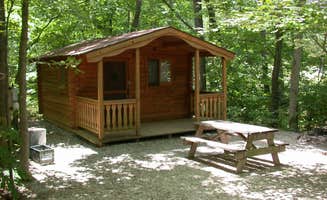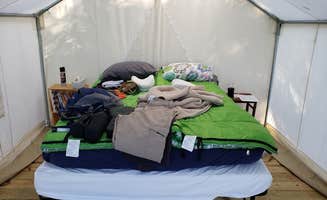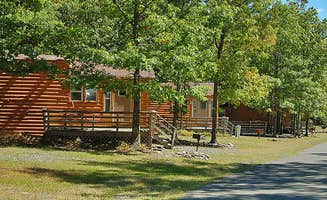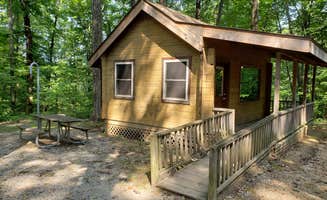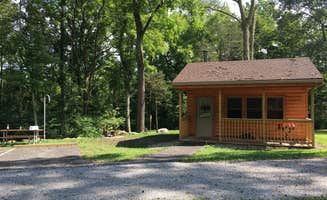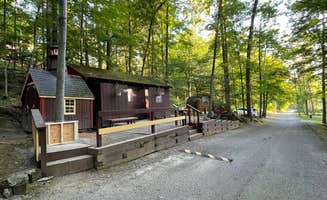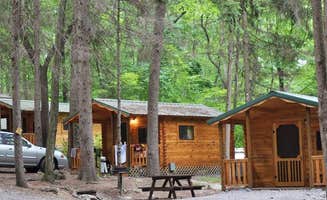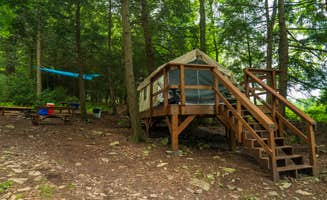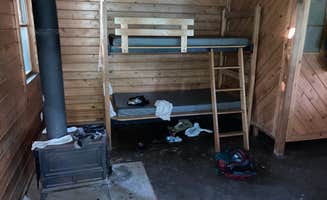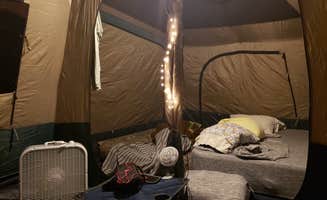The Delaware Water Gap region spans 70,000 acres across Pennsylvania and New Jersey, with campsites situated at elevations between 300-1,600 feet. The area receives about 45 inches of precipitation annually, creating a lush environment for camping. The region's 40+ miles of the Appalachian Trail attract hikers year-round, with most campgrounds open from April through October.
What to do
Hiking to waterfalls: Several trails near Hickory Run State Park Campground lead to scenic waterfalls. "We hiked both Hawk Falls and Shades of Death trails with our 2 large dogs. Both of these trails had a creek and waterfalls," shares one visitor. The trails are rated "more difficult" but many campers find them manageable.
Fishing in stocked lakes: Tobyhanna State Park Campground offers fishing opportunities in its reservoir. "Fish was great," notes one camper. The copper-colored lake supports various fish species, and some campsites are positioned right on the water for easy access.
Wildlife observation: The region hosts diverse wildlife including deer, wild turkeys, and black bears. "We saw wild turkeys and deer in the morning," reports a camper at Camp Taylor. Some parks issue bear warnings during peak seasons, so secure food storage is essential.
Boulder field exploration: A unique geological feature near Hickory Run State Park draws many visitors. "The boulder field was the highlight of our camping trip," writes one camper. This 16-acre field of large rocks creates an unusual landscape for exploration and photography.
What campers like
Privacy between sites: Camp Taylor Campground offers secluded camping spots. "Campsites are nice and large, can hold multiple tents. They request the purchase of another site if you have more than two tents," one camper explains. The wooded setting provides natural separation between sites.
Clean facilities: Campground maintenance stands out in reviews. "The bathrooms/showers are clean and well maintained," notes a camper at Camp Taylor. At Jenny Jump State Forest, one visitor appreciated that "the bathroom/shower was only a few steps away which was convenient and clean."
Swimming options: Many campgrounds feature swimming areas. "The swimming pond is pleasant and great to cool off in," writes a Camp Taylor visitor. Several parks offer both lake swimming and pools, giving campers options during hot summer days.
Enforced quiet hours: Campers with children appreciate when rules are followed. At Camp Taylor, "unlike many other campgrounds we've been to, they are very good about actually enforcing the quiet hours at night, so you can have an actual peaceful and quiet night around the campfire."
What you should know
Seasonal limitations: Most campgrounds operate from April through October. A few campgrounds like Delaware Water Gap / Pocono Mountain KOA remain open year-round, but with limited services during winter months.
Bear activity: Black bears are common throughout the region. "Just stayed 2 nights with my 7-year-old daughter. We were warned at check-in that there have been a lot of bears in the area but never really thought that we would see one. As soon as we got to our site one came right up as we were setting up our tent," reports a Tobyhanna camper.
Site differences: Campground layouts vary significantly. "The sites in this loop were spacious and more in an open area, but we were along a wooded area which gave us some shade," explains a Hickory Run visitor. Research specific site locations before booking.
Firewood restrictions: Local regulations often prohibit bringing outside firewood. "You have to buy their wood you can't bring any in, they are trying to keep the lantern flies away. $5 bundle for 7 pieces," notes a Camp Taylor visitor.
Tips for camping with families
Look for dedicated play areas: Great Divide Campground offers family-friendly amenities. "The common area, along with the pool, had a small soccer field and volleyball court. They also had scheduled activities for kids," writes one visitor. These features keep children entertained throughout your stay.
Choose sites near bathrooms: For families with small children, bathroom proximity matters. "Our camp site was great (52), backed onto a wooded area and a big playground was directly in front of us, which worked out perfectly since we have school age kids," shares a Delaware Water Gap KOA visitor.
Take advantage of free water activities: Many campgrounds offer complimentary water recreation. At Great Divide, "kids had lots of fun on the free kayaks and pool," according to one family. These amenities provide entertainment without additional cost.
Consider all-season camping options: For families seeking shoulder season trips, look for year-round facilities. "We enjoyed this campground! The pool was closed for the season when we were there, but the kids were able to enjoy an awesome playground and bounce pad," notes a Delaware Water Gap KOA visitor who camped off-season.
Tips from RVers
Request specific sites: At Otter Lake Camp Resort, site selection matters. "I loved being lakefront with full hook up. Such a beautiful and peaceful place. The campsites are kinda close together," explains an RV camper. Requesting specific sites can significantly improve your experience.
Check site leveling conditions: Many campgrounds in the region have uneven terrain. "Sites are hit or miss in terms of comfort, some have large, flat, clear spaces for multiple tents, some you have to wedge a tent to avoid rocks," reports a Jenny Jump visitor. This applies even more to RVs that require level ground.
Full-hookup availability varies: Check utility offerings when booking. "We opted to relocate to a site with less construction occurring and although you can still hear back hoes etc-our view has much improved," shares a Delaware Water Gap KOA visitor, highlighting the importance of site selection for RVs requiring hookups.
Verify access road conditions: Some campgrounds have challenging access roads. "The roads were also great for them to ride on and get exercise," notes one KOA visitor, while others mention steep grades that may challenge larger rigs.


